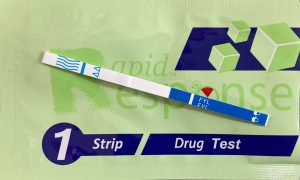February 20, 2023

As fentanyl-related overdose deaths are on the rise in North Carolina and across the country, a new survey by UNC Eshelman School of Pharmacy-affiliated and community-based researchers found North Carolina pharmacists are willing to sell fentanyl test strips (FTS) to help reduce the risk of overdoses. FTS have been shown to reduce overdose deaths and are a recommended harm reduction tool.
The survey, conducted by Grace Marley, UNC Eshelman School of Pharmacy Pharm.D. candidate, Bayla Ostrach, Ph.D., M.A., C.I.P., a community-based applied researcher and UNC Research Affiliate in the UNC School of Medicine, and Delesha Carpenter, Ph.D., M.S.P.H., associate professor in the Division of Pharmaceutical Outcomes and Policy, is the first of its kind in the United States.
It has been well-documented that pharmacies have increased access to naloxone, a medication used to reverse opioid overdoses, and this survey shows the potential impact that community pharmacists could have for increasing access to FTS as well.
“I was surprised at the level of willingness to sell FTS; it shows that pharmacists are open to making this life-saving tool available in their communities. Oftentimes, pharmacists are overlooked when delivering services to reduce opioid overdose deaths, though they are one of the most accessible health professionals in the country,” said Carpenter.
According to the United States Drug Enforcement Administration, fentanyl is a synthetic opioid that is 50-100 times stronger than morphine. It is often found in non-opioid drugs, such as cocaine and methamphetamines. Because of this, people who use drugs are sometimes not aware that the drug they are using contains an opioid, which can increase their risk of an opioid overdose.
The North Carolina Office of the Chief Medical Examiner reported that the state’s fentanyl-positive overdose deaths increased by 212% from 1,490 deaths in 2019 to 3,163 deaths in 2021. FTS can accurately determine the presence of fentanyl in unregulated substances, but access has remained limited primarily to syringe services programs. The survey revealed that reducing overdose risk is the number one reason community pharmacists are interested in selling FTS.
Although it is legal for North Carolina pharmacies to sell FTS, only two pharmacies in the state are currently distributing them, in partnership with a harm reduction organization. Carpenter and Marley agreed that the lack of awareness of FTS is the main issue and providing training is essential.
“Training is wanted and needed to increase knowledge regarding the logistics of this new tool, and also to increase a pharmacist’s confidence in counseling about FTS,” said Marley.
The survey found that although community pharmacists are willing to sell FTS, training is needed to address ways to overcome barriers and increase awareness of the product. The study authors hope the state will invest money to support this much needed training initiative.
Latest News

Dean Angela Kashuba receives Carolina Alumni Faculty Service Award

RASP poster presentations capture student research


